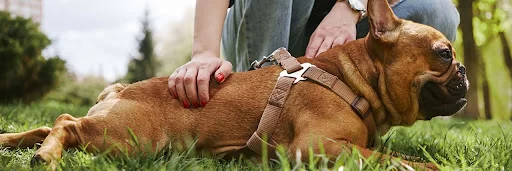Signs Your Pet Might Have a Gastrointestinal Problem
As pet owners, we always want what's best for our furry companions. When our pets start to act differently, we can’t help but feel concerned. One of the most common health issues that our pets face is gastrointestinal (GI) problems. These problems can range from mild discomfort to severe health risks, so it's important to recognize the signs early. In this article, I’ll share my experience with gastrointestinal problems in pets, common symptoms to look for, and what you can do to help your pet feel better.
1. Vomiting and Diarrhea: The Classic Signs
If your pet is vomiting or experiencing diarrhea, these are often the first signs of gastrointestinal distress. I’ve personally seen this happen when my dog, Max, ate something he shouldn’t have while on a walk. At first, I thought it was just a one-time occurrence, but when it continued for a couple of days, I started to get worried.
Vomiting and diarrhea can be caused by a variety of things, such as a sudden change in diet, food allergies, stress, or even ingesting something toxic. While occasional vomiting or diarrhea might not be a cause for alarm, persistent episodes can indicate a more serious problem. It's always a good idea to monitor the frequency and severity of these symptoms. If your pet’s vomiting or diarrhea doesn’t improve after a day or two, or if you notice blood in their stool or vomit, it's time to contact a vet.
2. Loss of Appetite: A Tell-Tale Sign
Another sign that your pet might be dealing with a gastrointestinal issue is a loss of appetite. Pets are usually enthusiastic about their food, so if they suddenly refuse to eat, it’s important to pay attention. My cat, Bella, is a picky eater, but when she stopped eating her favorite treats for a few days, I knew something was wrong. Loss of appetite often accompanies nausea or discomfort caused by GI problems, and it can sometimes be a precursor to vomiting or diarrhea.
If your pet’s loss of appetite persists for more than 24 hours, you should consult your vet. A loss of appetite can be a sign of infection, parasites, or something more serious like gastrointestinal inflammation or even organ dysfunction. If left untreated, it could lead to dehydration or malnutrition.
3. Abdominal Pain and Bloating
Have you noticed your pet suddenly become more sensitive when you touch their belly? Abdominal pain and bloating are other common signs of gastrointestinal problems. This was something I noticed when Max started acting strangely when I touched his stomach. His belly was swollen, and he seemed uncomfortable, so I immediately suspected a GI issue.
Abdominal discomfort in pets can be caused by gas, bloating, constipation, or more serious conditions like gastrointestinal obstruction. If your pet shows signs of abdominal pain, such as whining, refusing to move, or showing a hunched posture, it’s important to take them to the vet right away. A swollen belly can indicate a dangerous condition like bloat, which requires immediate attention.
4. Changes in Stool or Urine
Sometimes, changes in your pet’s stool can be a clear sign of gastrointestinal problems. If you notice that your pet's stools are unusually soft, hard, or have a strange color or odor, this could point to an issue with their digestive system. I’ve experienced this with my dog, Max, who had some very unusual stools after trying a new type of food. While it’s common for a pet’s stool to change after a diet switch, persistent changes or signs like blood in the stool are red flags that shouldn’t be ignored.
In addition to stool changes, pay attention to any changes in your pet’s urination habits. Difficulty urinating, increased urination, or straining can be related to GI problems, particularly if there’s an underlying infection or inflammation affecting the digestive organs. Monitoring your pet’s bathroom habits can give you vital clues about their health.
5. Lethargy and Behavior Changes
If your pet suddenly becomes lethargic or withdraws from their usual activities, it could be a sign that they’re not feeling well. GI problems can cause discomfort, and when your pet is in pain or feeling unwell, they may sleep more than usual or show little interest in their favorite activities. I remember when Bella started spending more time hiding under the couch after a bout of upset stomach. It was clear that her GI issue was making her feel miserable.
Lethargy is often accompanied by other symptoms like a reduced appetite or vomiting. If your pet is unusually tired, not interacting with you as they normally would, or seems to be in pain, it’s time to reach out to your veterinarian. Chronic lethargy can also signal more serious conditions like infections or organ issues.
6. Excessive Drooling or Bad Breath
Excessive drooling or a sudden change in your pet's breath can be an indication of gastrointestinal distress. I noticed that my dog Max started drooling excessively when he was dealing with an upset stomach. He also developed bad breath, which was different from his usual scent. This can happen when your pet is nauseous or experiencing an issue with their digestive system. Drooling can also occur when your pet tries to relieve discomfort caused by indigestion or gastrointestinal upset.
If your pet's drooling becomes excessive or their breath smells unusual, it's important to seek veterinary attention, especially if it's accompanied by other signs like vomiting, loss of appetite, or abdominal pain.
7. Why You Should Seek Professional Help
In many cases, gastrointestinal issues in pets can resolve themselves with proper care, like dietary adjustments, hydration, and rest. However, if the symptoms persist for more than a couple of days or worsen, it’s crucial to take your pet to the vet for a thorough examination. A vet can perform tests, such as blood work, stool samples, or imaging, to identify the underlying cause of the problem and recommend the best treatment options.
By keeping an eye on your pet’s behavior, diet, and bathroom habits, you can catch gastrointestinal problems early and ensure that your furry friend gets the care they need. If you suspect that your pet is dealing with a GI issue, don’t wait—contact your vet for advice and treatment.












